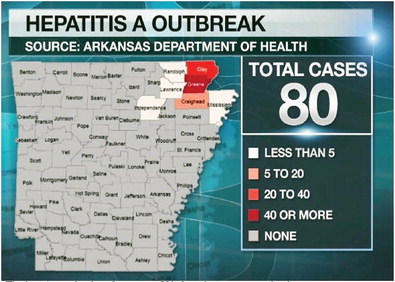Health Department warns of a possible Hep A exposure in Poinsett County

Health Department warns of a possible Hep A exposure in Poinsett County
Recent customers of Subway in Trumann urged to get tested
Arkansas Dept. of Health JONESBORO — Northeast Arkansas continues to have a hepatitis A (hep A) outbreak, and the ADH is warning of a possible hep A exposure after an employee of Subway in Trumann tested positive for the virus.
Anyone who ate at the Subway restaurant at 121 Hwy 463 North, Trumann, Ark. from Jan. 23 through Feb. 6, 2019, should seek vaccination immediately if they have never been vaccinated against hep A or are unsure of their vaccination status. There are no specific treatments once a person gets hep A. Illness can be prevented even after exposure by getting the vaccine or medicine called immune globulin, which contains antibodies to hep A. These work best to prevent illness if given within two weeks of exposure to the virus. Hep A vaccination can still prevent the virus after exposure.
The ADH will host vaccine clinics February 12 and 13, 2019, from 8 a.m.
to 5 p.m. in the Poinsett County Health Unit-Trumann at 1204 W. Main St., Trumann, Ark. The vaccine will be provided to the public at no cost. People should bring their insurance card and driver’s license if they have one.
Those who are unable to attend the clinics listed above because they are in another county may be able to visit a Local Health Unit in their county. Those visiting Local Health Units in other counties should call ahead to ensure vaccine is available. The Local Health Unit listing can be found at https://www.healthy.arkans as.gov/health-units.
Anyone experiencing symptoms should seek care immediately. Typical symptoms of hep A include fever, fatigue, loss of appetite, nausea, vomiting, abdominal pain, dark urine, clay-colored bowel movements, joint pain, or jaundice (yellowing of the skin or eyes). It can range in severity from a mild illness lasting a few weeks to a severe illness lasting several months. Risk of getting hep A in a food service setting is low. Restaurants must follow ADH protocols for handwashing and glove use, and employees are not to return to work until they are no longer sick. Hep A is being spread in this outbreak primarily through close contacts in the community, not through eating at restaurants.
Since February 2018, 276 cases of hep A have been reported as part of an outbreak in Northeast Arkansas, including three deaths. Greene, Craighead, and Clay counties have had the most cases, although there have been cases in Arkansas, Cleburne, Crittenden, Cross, Independence, Jackson, Lawrence, Lee, Logan, Mississippi, Monroe, Phillips, Poinsett, Randolph, Sharp and White counties.
High priority groups for getting the hep A vaccine include:
• Anyone who has had close contact with someone who has hep A
• Food workers
• People who use drugs, whether injected or not
• People experiencing homelessness, transient, or unstable housing
• People who have been recently incarcerated The hep A vaccine is safe and effective. Hep A is a contagious liver disease that results from infection with the hep A virus, which is a different virus from the viruses that cause hep B or hep C. It is usually spread when a person ingests tiny amounts of fecal matter from contact with objects, food or drinks contaminated by the feces (stool) of an infected person.
A person can transmit the virus to others up to two weeks before and one week after symptoms appear. If infected, most people will develop symptoms three to four weeks after exposure; however, the virus can cause illness anytime from two to seven weeks after exposure.
Many people, especially children, may have no symptoms. Almost all people who get hep A recover completely and do not have any lasting liver damage, although they may feel sick for months.
Older people typically have more severe symptoms. Other risk factors for having more severe symptoms of hep A include having other infections or chronic diseases like hep B or hep C, HIV/AIDS, or diabetes. Up to one in three adults are typically hospitalized. Death due to hep A is rare, but is more likely in patients with other liver diseases (like hep B or hep C).
For more information about hep A and updated information about the outbreak in Arkansas, please visit www.healthy.arkansas.gov.

From Meg Miravel


Share